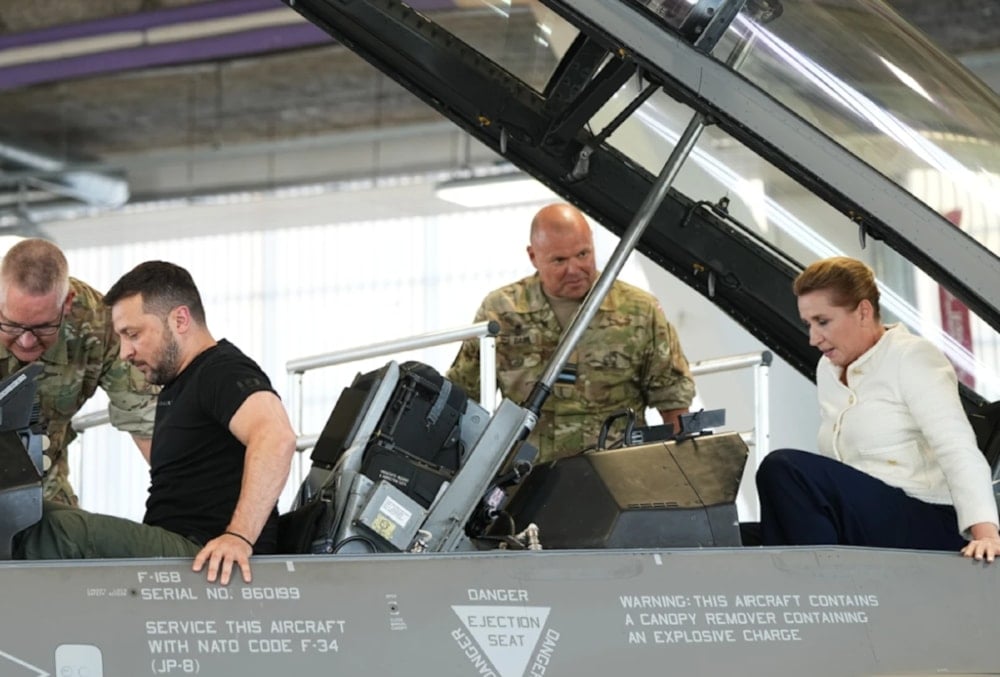Zelensky announces delivery of second batch of F-16 jets from Denmark
The recent delivery follows Denmark's November shipment of six F-16 jets, with a further 13 pledged for future transfer.
-

Ukrainian President Volodymyr Zelensky and Denmark's Prime Minister Mette Frederiksen sit in an F-16 fighter jet in Denmark, on August 20, 2023. (AP)
Denmark has sent a second batch of F-16 fighter jets to Ukraine, Ukrainian President Volodymyr Zelensky announced on Saturday.
"The second shipment of Ukraine-bound F-16s from Denmark is already in Ukraine," Zelensky wrote on Telegram.
He commended Denmark for its "determination" and expressed gratitude to Danish Prime Minister Mette Frederiksen and her team.
In November, Denmark delivered six F-16 jets to Ukraine and committed to providing 13 more in the future.
Russia has consistently argued that arms shipments to Ukraine complicate efforts to resolve the conflict and position NATO countries as parties in the war.
Russian Foreign Minister Sergey Lavrov has lately warned that any cargo containing weapons destined for Ukraine will be considered a legitimate target by Russia.
80,000 US troops stationed in Europe to 'deter Russia': Biden
Earlier today, outgoing US President Joe Biden informed Congress about the presence of 80,000 American troops stationed in European countries, emphasizing their role in countering "Russian aggression".
The US President’s office released a letter from Biden to the Speaker of the House of Representatives and the temporary head of the Senate, providing a report on military authorities, “to keep the Congress informed about deployments of United States Armed Forces equipped for combat.”
In a letter to congressional leaders, Biden stated that "approximately 80,000 United States Armed Forces personnel are assigned or deployed to North Atlantic Treaty Organization countries in Europe, including those deployed to reassure our allies and to deter further Russian aggression."
Russian President Vladimir Putin, in a February interview with American journalist Tucker Carlson, dismissed claims of Moscow planning to attack NATO countries, describing such an action as pointless.
Putin further remarked that Western politicians frequently invoke the notion of a Russian threat to instill fear and divert public attention from domestic issues.
Plans for 800K NATO troop deployment exposed
In November it was revealed that according to secret documents, Berlin has begun planning for the deployment of up to 800,000 NATO troops, including Americans, into Ukraine as tensions with Russia escalate, the New York Post reported.
"Operation Deutschland" is a 1,000-page plan to prepare Germany for a potential World War III scenario.
According to the German daily Frankfurter Allgemeine Zeitung, the top-secret documents explain particular structures and infrastructure to safeguard so that the military may use them, as well as how companies and people can prepare in the event of heightened threats.
They also hinted that Berlin was planning to move 200,000 military vehicles across German soil if the alliance was forced to help Ukraine's operations, though additional specifics were kept confidential.
Germany also instructed individuals, through the documents, on how to prepare for the worst by increasing their self-sufficiency through methods, such as installing diesel generators or wind turbines.
The worry is not limited to Germany. Sweden and Norway have also lately released leaflets and material teaching residents how to prepare in case the Ukraine war spills over into their nations.
The growing fear comes as Russian President Vladimir Putin formally revised the Kremlin's nuclear strike doctrine on Tuesday, saying that Moscow may now deploy nuclear weapons to counter non-nuclear, "conventional weapons" attacks.
Russia rejects claims of nuclear threat, warns of escalation risks
Amid escalating geopolitical tensions, the Russian Foreign Ministry has firmly rejected accusations of nuclear threats, dismissing them as "deliberate anti-Russian lies." In a statement on Thursday, Foreign Ministry spokesperson Maria Zakharova reaffirmed that Russia’s nuclear policy remains strictly defensive and aligns with its international obligations.
"Russia is not threatening anyone with nuclear weapons, and any claims to the contrary are nothing more than deliberate anti-Russian lies. We treat the policy in the area of nuclear deterrence with the utmost seriousness and responsibility," Zakharova said.
She further added that Russia finds it necessary to caution against the risks of a direct military confrontation between nuclear powers and its potentially severe consequences, while also delivering "specific sobering signals" to reinforce these warnings.
Russia's doctrinal policies remain fundamentally defensive, clearly defining the exceptional circumstances under which the nation retains the right to use nuclear weapons in self-defense, Zakharova stated.
The spokesperson noted that Russia's nuclear doctrine is firmly grounded in deterrence and strictly defensive. She clarified that the policy allows for the use of nuclear weapons only under extreme circumstances, such as in response to existential threats.
"Russia's official statements on the aforementioned issues do not go beyond the scope of these guidelines and are fully consistent with our country's international obligations. This is not the language of threats, but the classic logic of containment," she added.

 5 Min Read
5 Min Read









